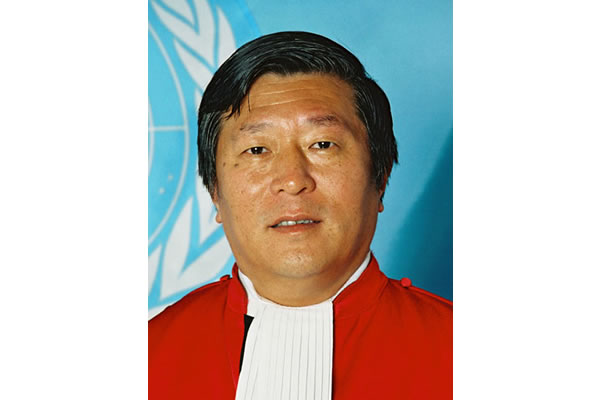Home
NO CONSISTENCY OR RIGOUR
In the wake of Momcilo Perisic’s judgment
In his separate dissenting opinion appended to the judgment acquitting Momcilo Perisic, Judge Liu warned that the criterion of ‘specific direction’ – used by the majority to quash the trial judgment – has not been used consistently or rigorously in the jurisprudence. As he notes, it is not necessary to prove there was a ‘specific direction’ in order to prove aiding and abetting. To insist on ‘specific direction’, Judge Liu notes, ‘effectively raises the threshold…and allows those responsible for knowingly facilitating the most grievous crimes to evade responsibility for their acts’
 Liu Daqun, judge at the Tribunal
Liu Daqun, judge at the Tribunal What might constitute proof that the logistic, personnel and other assistance Momcilo Perisic provided to the Bosnian Serb army as the chief of the VJ General Staff was ‘specifically directed’ at the crimes committed in Sarajevo and Srebrenica?
Judging by the reasoning of the majority in the Appeals Chamber – judges Meron, Agius, Ramaroson and Vaz, the best proof of Perisic’s aiding and abetting would be a document with his signature stating something along the lines of, ‘Ratko, I am sending you cannons, howitzers, mortars, the ammunition of various caliber and trained gunners, so you can fire on Sarajevo and roll out their minds’.
There is no such evidence. The ‘only’ evidence is that all those weapons, ammunition and staff were sent to them from Serbia. According to the majority, that was not ‘specifically directed’ at the commission of crimes but at providing assistance to the Bosnian Serb army in their war effort. Perisic was not responsible for the fact that Mladic indeed used the aid he received to ‘roll out the minds’…: this because the assistance he received from the Serbs on the other bank of the Drina river was not ‘specifically directed’ at the crimes and because the VRS wasn’t ‘a criminal organization’. The majority allowed the possibility that Serbia could be responsible for that but underscored – without any perceptible regret – that the Tribunal had no jurisdiction over states.
Judge Daqun Liu disagreed with this reasoning and the majority’s findings. In his partially dissenting opinion, the experienced Chinese judge, who has been at the Tribunal since March 2000, notes that the criterion of the ‘specific direction’ hasn’t been applied consistently or rigorously in the Tribunal’s jurisprudence. It is therefore not necessary to prove there was the specific direction in order to prove that the accused was guilty of aiding of abetting. On the contrary, Judge Liu notes that the ‘jurisprudence of the Tribunal demonstrates that aiding and abetting liability may be established without requiring that the acts of the accused were specifically directed to a crime’. Moreover, in Judge Liu’s view, in the previous cases the Appeals Chamber ‘accorded extremely limited importance’ to the specific direction criterion.
Judge Liu considers that the Trial Chamber didn’t err when it found Perisic guilty of aiding and abetting the crimes committed by the VRS commanders and soldiers in Sarajevo and Srebrenica. According to Judge Liu, Perisic’s acts constitute a ‘prime example’ of the conduct that is qualified as aiding and abetting.Even if the ‘specific direction’ were a required element of aiding and abetting, the Chinese judge concluded, the acquittal wouldn’t be justified given the ‘magnitude, critical importance and continued nature of the assistance Perisic provided to the VRS’.
Warning that the majority’s judgment marked a ‘shift’ in the Tribunal’s jurisprudence, Judge Liu said it ‘raises the threshold for aiding and abetting liability’. This, in Judge Liu’s view, undermines the very point of the liability for aiding and abetting and allows those who knowingly facilitate grievous crimes to evade their responsibility.
In their first reactions to the Appeals Chamber’s latest judgment, international criminal law experts argued that Momcilo Perisic’s acquittal called into question the Tribunal’s previous findings on the relationship and links between the Yugoslav Army and the Republika Srpska Army. Perisic’s acquittal, according to the experts, could lead to the demands for the review of some previous convictions.
Linked Reports
- Case : Perisic
- 2013-02-28 APPEALS CHAMBER ACQUITS GENERAL PERISIC
- 2013-02-15 FINAL JUDGMENT FOR PERISIC ON 28 FEBRUARY 2013
- 2012-10-30 APPELLATE HEARING IN GENERAL PERISIC'S CASE
- 2013-03-05 JUDGES COULDN’T SEE THE WOOD FOR THE TREES
- 2013-03-06 SPECIFIC DIRECTION OF APPEALS CHAMBER’S LATEST JUDGMENTS
- 2014-02-03 PROSECUTION ASKS FOR RECONSIDERATION OF PERISIC JUDGMENT
